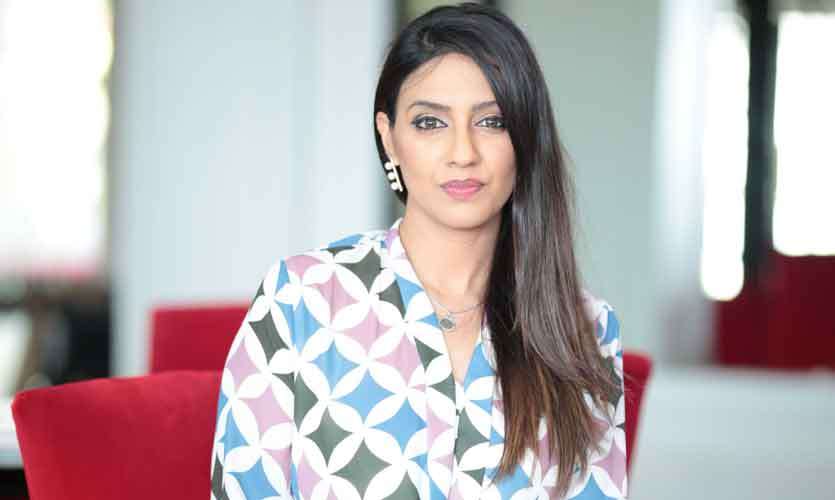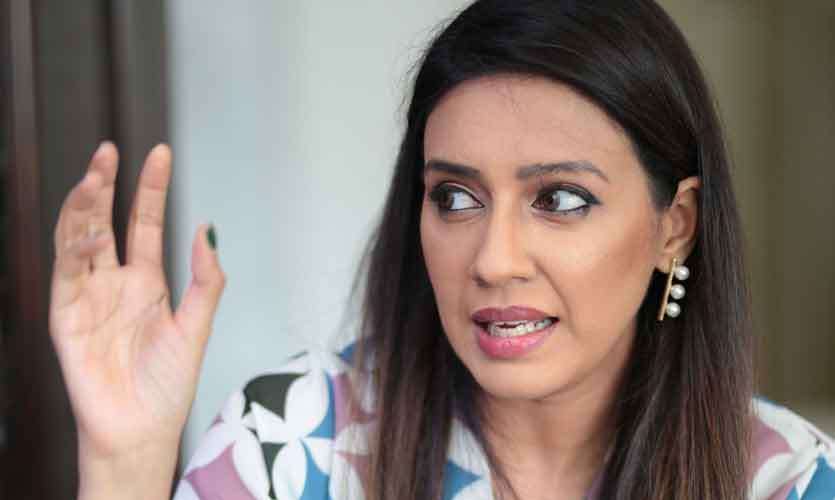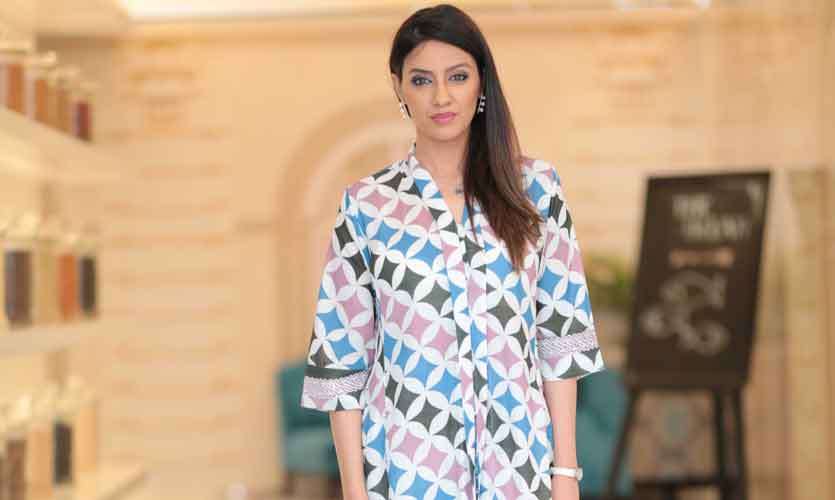
Sep 26 2019.
views 955Dr. Anjhula Mya Singh Bais, a psychologist by profession wears many hats. She’s an activist, academic, an aristocrat, and is the only international psychology trauma specialist in Malaysia where she has been residing with her husband Satish Selvanathan. Dr. Bais has used her platform and her voice to empower women, speaking out on issues she is passionate about such as the climate crisis. Dr. Bais recently sat down for a tête-à-tête with Daily Mirror Life to talk of her role in Amnesty International, empowerment, social media and the climate crisis.

You’re married to a Sri Lankan, but your ties to Sri Lanka extends beyond that and you based your PhD on a Sri Lankan subject.
I’ve been back to Sri Lanka more times than he has. My PhD dissertation was based on Sri Lanka; more specifically the trauma of leadership in Colombo. When you’re doing a PhD you need to either do a topic that’s never been done before or you need to take a topic that's been done before and do it in a different way. And the interesting thing is, obviously the lower middle socioeconomic status is very important and they have different issues and drivers, but as a psychologist, you have compassion and empathy for everybody. So generally people would say “what problems do rich people and powerful people have? Nothing!”, and so that's a demographic that's completely ignored. I know they might be making decisions that are frowned upon by everybody, but they’re also human. So when they watch a relative or someone they know being assassinated, who’s dealing with their trauma? And now the mental health of leaders has come to the forefront because look at Trump. And everyone’s like, that can’t be ignored. So psychologists have a rule called the Goldwater rule where you can't diagnose or analyse someone that you haven't seen in treatment. But psychologists, we actually broke that rule and wrote an open letter to the New York Times about how we’re very convinced that Trump has narcissistic personality disorder. And you’re leading one of the most powerful nations in the world, so imagine the decisions that will affect the whole country. I wanted to focus on that and at first my university was like - it was pushed back - and then they said no. How do you gain access? At that point there was that shift from Rajapakse’s government to Ranil’s. So much was going on and you could see the difference between one government’s willingness to speak, another government’s willingness to speak, but in the end, my research earned a distinction for the first time in 5 years at the university. It went down really well for me and even during the viva and everything. I think when you are personally invested in a topic, you can't bullshit authenticity. Like, ask me anything. Some of my classmates were so nervous about their viva - their oral defence - that they didn’t invite anybody. Mine was open to the whole university. It was Satish’s request that I focus on Sri Lanka because as a psychologist and trauma specialist.

There’s no doubt your innate need to reach out and empower people may have also stemmed from the fact that you’re a psychologist. But is this something you always wanted to do?
See that’s a good question because most people say you act and speak like this because you’re a psychologist. I say No. I’m like this and that's why I became a psychologist. Even when I was around 14 years old, my friends - boys and girls - would speak to me, share, trust and I think there's a way to facilitate relationships with people and then and at some point I’m like, I can make a profession out of this and get paid for it. It's a calling. A lot of people think, well I’m a good listener and therefore I can become a psychologist. It's much more than that. It's a lot like saying the neighbourhood photographer took a picture of me so I’m a model.
You have been actively campaigning and using your platforms to support many causes...
I think you can use fame in a multitude of ways and you can become famous in a multitude of ways and I am about female empowerment, so I'm not at all knocking Kim Kardashian. To each their own. But I think it’s inarguable that part of what launched her to fame was a sex tape. That's one route. And then I see, for example, what Angelina Jolie has done, where she is an actress, and in addition to being a producer / director she's a UN special envoy. Celebrity has an amazing reach and I think with anything, money, social media, all of these things are neutral, it's how you use it. So you can be tweeting about taking a selfie or you can be tweeting about passionate views and real time news of what's happening. For example, I met a Pakistani gentleman many years ago at the World Economic Forum who was in Abbottabad walking around at 1 am and he was the first civilian to see the navy seals landing in the dark on Osama Bin Laden’s house. And he tweeted that. That to me is an amazing use of twitter. Similarly, when people are like, you’ve been on this cover or that cover, Vogue Top Model, Fashion Week, so what do you do with it? I’m very fortunate that between my family and Satish’s family I don’t need to concentrate or worry about the usual things, so how could I not use my voice? I have so much energy and freedom.
For example in Malaysia, Prime Minister Mahatir’s, daughter doesn’t wear the hijab (tudong) and she fights for women’s rights to choose whether to wear or not to wear. She can do that without great fear for her life because she is Mahatir’s daughter. It's her choice to go out and speak whereby she could be just chilling.
At a magazine cover shoot, you requested that your image was not photoshopped. We live in a world where reality is painstakingly edited to reveal the notion of perfection.
As a psychologist, I understand that so much of it is smoke and mirrors. When I see women in therapy, there is a whole compare and despair phenomenon. You see somebody’s Facebook status “I went on a round the world cruise” but they’re purposely leaving out the fact that they ate something and half the time they had food poisoning. So it just looks awesome and everybody has a fear of missing out (FOMO), but Satish and I have actually cultivated a mindset that’s “JOMO”, the joy of missing out. We are very happy to be in bed at 10pm with a cup of tea and that's it. I always share this true story. I was going to the gym at 7 in the morning and there’s this girl next to me on the treadmill in beautiful designer workout clothes, beautiful makeup, smooth hair, picture perfect and her instagram husband is filming her. She running at Olympic speed on this treadmill and everyone at the gym is like “wow”, she runs for 10 seconds, gets off, gets a smoothie and leaves the gym. And then she posts this video on instagram ‘#beachbody #fitness #discipline #justdoit #mindovermatter’. So anybody watching that would think “what is wrong with me? Look at how far I fall short of the ideal. Everybody else can do it. I’m useless”.

I’m not a huge fan of prescribing or recommending medicine, I think we have the power to heal ourselves. There are some people who will need it, so with huge discretion is it recommended, because it can at times be a shortcut because you just pop pills and don’t do the inner work. The first thing I do is tell all my patients to uninstall social media, and they do that and without any therapy or medication they start getting better because the mental health effects of social media is not yet understood, but it’s pointing in the direction of not good.
But certainly, social media is not all bad.
Yes, there are developments that are also positive. I think what happens is, energy follows thought, so whatever we focus on starts expanding. As humans we all have PhDs on focusing on the negative. The good news is the way social media is able to connect people, a lot of suicides have been averted because lots of people have been able to flag it on time. And Instagram, I think in the US and UK, is rolling out the idea of no likes. So just imagine being able to post photographs where you’re posting for the love of posting and not garnering a popularity competition. This will also change the game for social media influencers - they make money based on their followers but it’s not necessarily organic or authentic. The need of the day is serious authenticity.
You were the youngest person to chair the board of governance for Amnesty International Malaysia and you now sit on the International Board for Amnesty International. What is the scope of your role at Amnesty.
I started my journey in Amnesty as a volunteer and then I became a member, and then I became chair of the board of governance in Malaysia. I was the youngest chair and that was very interesting because normally, Amnesty is populated with lawyers and in certain countries we know there’s a patriarchal culture, so at times it’s like what's up with this woman who’s young and that's not a lawyer. Amnesty is increasingly placing more of an emphasis on wellness and organisational change. And this is what I do as a psychologist. I ran for the international board, it is the first time for someone from Malaysiato be on the international board which is elected by the Global Assembly. As directors of Amnesty International, the board is responsible for being the stewards of the values and the mission of this Nobel Peace Prize winning organization.
The recent Amazon fires were a talking point globally, and incidentally, the climate crisis is topic you are quite passionate about.
There’s a large population here that are Buddhist in Sri Lanka and there is a Buddhist concept of dependent origination - we’re all connected. So if you look at the cup of coffee I’m having, you know how many people it took to get this coffee into my hands? Where were the coffee beans roasted? Maybe in Ethiopia. Then someone might have harvested it, then the truck would have had to go to Addis Ababa. Then it would have had to clear immigration to fly, then it landed in Colombo and someone cleared that and someone unpacked that and someone made it. So look how many people it took! It's not just happening in Brazil, and this is what I want people to wake up to. I think what happens psychologically is that in one way we’re thinking about immortality, it is an existential issue, and people are stressed out with their lives and so busy that they are like “well, I don’t have time for this” not realising that ultimately, you are marching to your death. That’s literally the lungs of our world, the Amazon. I was in Greenland in May studying climate change with the World Economic Forum. Twenty Young Global Leaders were selected from around the world to study with leading climate scientists and we saw an iceberg that was skyscraper size breaking in half in front of us. The waves were tsunami level high and my colleagues started running for their lives and one week later, Al Gore used that footage in Australia to teach about climate change.
You have to understand your audience and tailor the message so that it moves people's hearts and understanding. Most lay people don't want to understand carbon neutrality, the scientific numbers. Malaysia is a Muslim majority country, and I said, simply, in 10 years its going to become so hot you cannot go to Mecca. You can't do your pilgrimage, and all of a sudden, people were listening. Now it hits home, and that's fair. Everyone doesn’t need to be a scientist. Everybody can do something. You can’t say, it’s not my problem. Stop using plastic straws. Take a 5-minute shower instead of a 10 minute shower. Imagine if 8 billion people did that.
You have already achieved so much, but where do you see yourself in the next 5 years?
There’s a saying that you need to learn the rules like a master to break them like an artist. To me it's very interesting there’s a billion-dollar industry of yoga when every Indian knows how to do the Surya Namaskar. I'm from Rajasthan. All the royal families are so connected to the land - there's water harvesting, energy harvesting. You look at all these ancient palaces and castles that we had, the way they were making the sundial astrologically, solar, nuclear power. We totally got it. We need to harness that and we need to lead from the Global South. Even if you look here, this island nation, it’s always known how to get on, and then it got colonized. Even eating on a banana leaf, that's not random. That's recyclable. They always knew that. So I think this part of the world has a huge role to play and we need to rediscover and unearth that. I made a vow to devote the rest of my life to the climate crisis. So in one role or the other I champion the climate. At the moment, Amnesty is a very interesting vehicle through which to do that as Amnesty along with other human rights groups will be using the full weight of human rights law for example to come after the fossil fuel industry.
Pics by: Damith Wickramasinghe
0 Comments